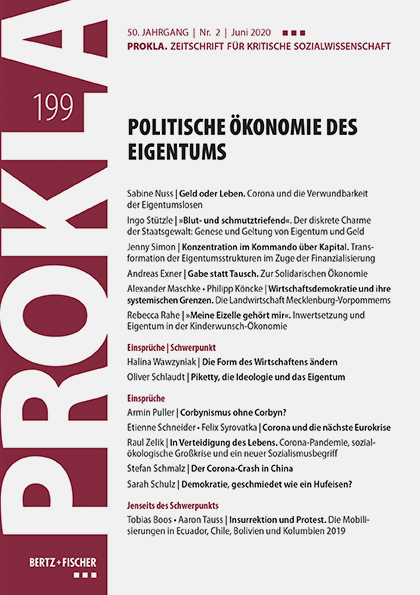Gabe statt Tausch
Mit Solidarischer Ökonomie zur sozial-ökologischen Transformation
DOI:
https://doi.org/10.32387/prokla.v50i199.1866Schlagwörter:
Postwachstum – Solidarische Ökonomie – Genossenschaften – Eigentum – Gabe – MarktwirtschaftAbstract
Solidarische Ökonomien betten wirtschaftliches Handeln in soziale Beziehungen ein, die natürliche und soziale Qualitäten berücksichtigen und Konkurrenzdynamiken zurückdrängen können, sofern sie demokratisch gestaltet werden. Die Entwicklung Solidarischer Ökonomien ist ein demokratisches Mehrebenenprojekt, das Gabepraktiken anstelle von Markt und Tausch in den Mittelpunkt stellt. Solidarische Ökonomien sind unter Marktbedingungen überlebensfähig und können sich als demokratische Organisationen reproduzieren. Sie stärken soziale und demokratische Orientierungen, und spielen eine wichtige Rolle in der Ökologisierung der Produktion. Eine Transformation muss staatliche Verhältnisse mit einbeziehen und den kapitalistischen Sektor durch solidarökonomische Organisationen ersetzen.
Downloads
Literaturhinweise
Adloff, Frank (2018): Politik der Gabe. Für ein anderes Zusammenleben. Hamburg.
Adloff, Frank / Mau, Stefan (2006): Giving Social Ties, Reciprocity in Modern Society. In: European Journal of Sociology 1: 93-123.
Altvater, Elmar (2005): Das Ende des Kapitalismus wie wir ihn kennen. Eine radikale Kapitalismuskritik. Münster.
Burawoy, Michael (2013): Ethnographic fallacies: reflections on labour studies in the era of market fundamentalism. In: Work, employment and society 27(3): 526-536. DOI: http://doi.org/10.1177/0950017012460316.
Caillé, Alain (2008/ Orig. 2000): Anthropologie der Gabe. Frankfurt/M.-New York.
Cosme, Inês / Santos, Rui / O’Neill, Daniel (2017): Assessing the degrowth discourse: A review and analysis of academic degrowth policy proposals. In: Journal of Cleaner Production 149: 321-334. DOI: http://doi.org/10.1016/j.jclepro.2017.02.016.
Dawkins, Sarah / Tian, Amy Wei / Newman, Alexander / Martin, Angela (2017): Psychological ownership: A review and research agenda. In: Journal of Organizational Behavior 38(2): 163-183. DOI: http://doi.org/10.1002/job.2057.
Derrida, Jacques (1993): Falschgeld. Zeit geben I. München.
Dewey, John (2016/ Orig. 1927): The Public and its Problems. An Essay in Political Inquiry. Athens-Ohio.
Exner, Andreas (2014): Degrowth and Demonetization: On the Limits of a Non-Capitalist Market Economy. In: Capitalism Nature Socialism 25(3): 9-27. DOI: http://doi.org/10.1080/10455752.2014.882963.
– (2015a): Commons: ein nomadisierender Begriff im Wandel von Bedeutungsfeldern. Anmerkungen zur theoretischen Analyse des Werks von Elinor Ostrom und linksalternativer Bezüge darauf. In: Emanzipation 5(1): 119-155.
– (2015b): Solidarische Ökonomie in Österreich Sichtweisen, Erfahrungen und Perspektiven. URL: http://at.solidarityeconomy.eu, Zugriff 27.4.2020.
– (2019): Das solidarökonomische Paradigma. Eine gabetheoretische Grundlegung. In: SWS Rundschau 59(4): 413-433.
– / Kratzwald, Brigitte (2012): Solidarische Ökonomie und Commons. Wien.
Flieger, Burghard (1997): Produktivgenossenschaft als fortschrittsfähige Organisation. Theorie, Fallstudie, Handlungshilfen. Marburg.
Gerber, Julien-François / Steppacher, Rolf (2017): Basic principles of possession-based economies. In: Anthropological Theory 17(2): 217-238. DOI: http://doi.org/10.1177/1463499616686009.
Graeber, David (2001): Toward an Anthropological Theory of Value. The False Coin of Our Own Dreams. New York.
Jessop, Bob (2013): Revisiting the regulation approach: Critical reflections on the contradictions, dilemmas, fixes and crisis dynamics of growth regimes. In: Capital & Class 37(1): 5-24. DOI: http://doi.org/10.1177/0309816812472968.
Lee, Kibeom / Ashton, Michael C. / Choi, Julie / Zachariassen, Kayla (2015): Connectedness to Nature and to Humanity: their association and personality correlates. In: Frontiers in Psychology (6): 1003. DOI: http://doi.org/10.3389/fpsyg.2015.01003.
Mauss, Marcel (1967/ Orig. 1926): Manuel d’ethnographie. Paris. DOI: http://dx.doi.org/doi:10.1522/cla.mam.man.
– (1990/ Orig. 1925): Die Gabe. Form und Funktion des Austauschs in archaischen Gesellschaften. Frankfurt/M.
Neaman, Alexander / Otto, Siegmar / Vinokur, Eli (2018): Toward an Integrated Approach to Environmental and Prosocial Education. In: Sustainability 10(3): 583. DOI: http://doi.org/10.3390/su10030583.
Pérotin, Virginie (2014): Worker Cooperatives: Good, Sustainable Jobs in the Community. In: Journal of Entrepreneurial and Organizational Diversity 2(2): 34-47. DOI: http://doi.org/10.5947/jeod.2013.009.
Polanyi, Karl (1979): Ökonomie und Gesellschaft. Frankfurt/M.
– (1997/ Orig. 1944): The Great Transformation. Politische und ökonomische Ursprünge von Gesellschaften und Wirtschaftssystemen. Frankfurt/M.
Putnam, Robert (1993): Making Democracy Work: Civic Traditions in Modern Italy. Princeton.
Roelants, Bruno / Hyungsik, Eum / Terrasi, Elisa (2014): Cooperatives and Employment: A Global Report. URL: https://www.ica.coop/, Zugriff: 21.4.2020.
Storey, John / Basterretxea, Imanol / Salaman, Graeme (2014): Managing and resisting ›degeneration‹ in employee owned businesses: A comparative study of two large retailers in Spain and the United Kingdom. In: Organization 21(5): 626-644. DOI: http://doi.org/10.1177/1350508414537624.
Strathern, Marilyn (1990/1988): The Gender of the Gift. Berkeley u.a.
Vaughan, Genevieve (1997): For-Giving: A Feminist Criticism of Exchange. Austin.
Weber, Wolfgang G. / Unterrainer, Christine / Höge, Thomas (2019): Psychological Research on Organisational Democracy: A Meta-Analysis of Individual, Organisational, and Societal Outcomes. In: Applied Psychology 1-63, DOI: http://doi.org/10.1111/apps.12205.





